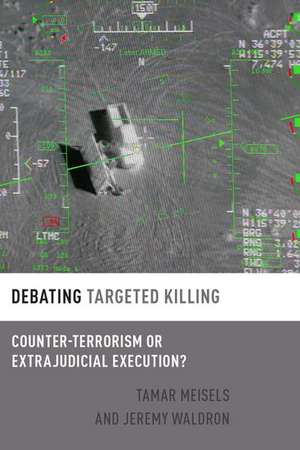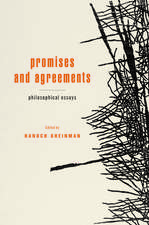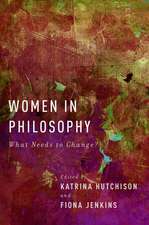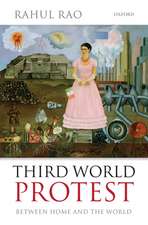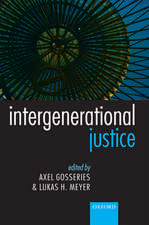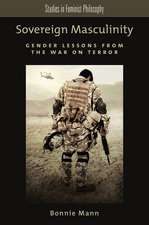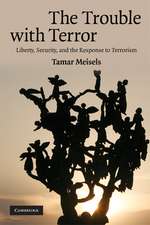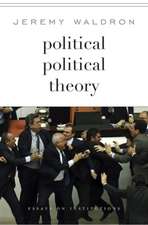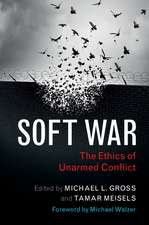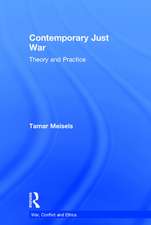Debating Targeted Killing: Counter-Terrorism or Extrajudicial Execution?: Debating Ethics
Autor Tamar Meisels, Jeremy Waldronen Limba Engleză Paperback – 29 iun 2020
Preț: 156.80 lei
Preț vechi: 169.58 lei
-8% Nou
Puncte Express: 235
Preț estimativ în valută:
30.00€ • 31.41$ • 24.97£
30.00€ • 31.41$ • 24.97£
Carte disponibilă
Livrare economică 26 februarie-04 martie
Preluare comenzi: 021 569.72.76
Specificații
ISBN-13: 9780190906924
ISBN-10: 0190906928
Pagini: 328
Dimensiuni: 206 x 135 x 20 mm
Greutate: 0.36 kg
Editura: Oxford University Press
Colecția OUP USA
Seria Debating Ethics
Locul publicării:New York, United States
ISBN-10: 0190906928
Pagini: 328
Dimensiuni: 206 x 135 x 20 mm
Greutate: 0.36 kg
Editura: Oxford University Press
Colecția OUP USA
Seria Debating Ethics
Locul publicării:New York, United States
Recenzii
The book will certainly be a useful jumping-off point to stimulate discussion, not only in the classroom but elsewhere as well... Recommended. All readers.
In this important volume in the Oxford series 'Debating Ethics,' Meisels (School of Political Science, Government, and International Relations, Tel Aviv Univ.) and Waldron (New York Univ.) have done an admirable job of foregrounding the practical and moral conundrums associated with the practice known as 'targeted killing.' Although both authors draw on examples from history, much of their discussion focuses on recent instances in the context of ongoing Middle East conflicts and the 'war on terror.' Both authors provide well-documented evidence and extensive, clearly presented argumentation in support of their positions, presented in the form of a debateClearly, the debate about this controversial practice of powerful states remains important and unresolved. Consequently, the book will certainly be a useful jumping-off point to stimulate discussion, not only in the classroom but elsewhere as well...Summing Up: Recommended. All readers.
Debating Targeted Killing is a balanced book, opening up the topic for civilians as well as experts in IHL [international humanitarian law]. It features all major arguments about the debate in the legal community and even goes beyond that. The authors present their opposing views with expertise and finesse. A very fine read.
Targeted killings, as illustrated by President Trump's decision to assassinate Iran's most senior military official, are an increasingly common phenomenon. When apparently carried out by Russia on UK territory, they generate widespread outrage. But when the American and Israeli governments set precedents that risk dramatically weakening the constraints on official murder, many commentators approve. While avoiding a slugfest, Meisels and Waldron succeed in articulating the strongest possible cases for and against this lamentable practice. Sadly, it seems likely that their sophisticated, illuminating and highly readable exchange will need to be widely read in the years ahead.
The action of targeted killing brings forth many difficult questions. My personal perspective is both legal and judicial. I wrote one of the few opinions which dealt with the practice of targeted killings. I am convinced that if this book had been available to me while writing that opinion, I would have written a deeper, more conscious opinion. Would I have changed the analysis of my opinion, or the result I had arrived at? The answer to that must be deduced by the reader of this important and in-depth volume, themselves.
This book offers a lot of valuable discussion of a growing trend in contemporary global politics. The authors succeed in highlighting both the promises and perils of this practice, and do so through distinct philosophical approaches. The result is a book that is challenging, rewarding, and both theoretically and practically rich.
In this important volume in the Oxford series 'Debating Ethics,' Meisels (School of Political Science, Government, and International Relations, Tel Aviv Univ.) and Waldron (New York Univ.) have done an admirable job of foregrounding the practical and moral conundrums associated with the practice known as 'targeted killing.' Although both authors draw on examples from history, much of their discussion focuses on recent instances in the context of ongoing Middle East conflicts and the 'war on terror.' Both authors provide well-documented evidence and extensive, clearly presented argumentation in support of their positions, presented in the form of a debateClearly, the debate about this controversial practice of powerful states remains important and unresolved. Consequently, the book will certainly be a useful jumping-off point to stimulate discussion, not only in the classroom but elsewhere as well...Summing Up: Recommended. All readers.
Debating Targeted Killing is a balanced book, opening up the topic for civilians as well as experts in IHL [international humanitarian law]. It features all major arguments about the debate in the legal community and even goes beyond that. The authors present their opposing views with expertise and finesse. A very fine read.
Targeted killings, as illustrated by President Trump's decision to assassinate Iran's most senior military official, are an increasingly common phenomenon. When apparently carried out by Russia on UK territory, they generate widespread outrage. But when the American and Israeli governments set precedents that risk dramatically weakening the constraints on official murder, many commentators approve. While avoiding a slugfest, Meisels and Waldron succeed in articulating the strongest possible cases for and against this lamentable practice. Sadly, it seems likely that their sophisticated, illuminating and highly readable exchange will need to be widely read in the years ahead.
The action of targeted killing brings forth many difficult questions. My personal perspective is both legal and judicial. I wrote one of the few opinions which dealt with the practice of targeted killings. I am convinced that if this book had been available to me while writing that opinion, I would have written a deeper, more conscious opinion. Would I have changed the analysis of my opinion, or the result I had arrived at? The answer to that must be deduced by the reader of this important and in-depth volume, themselves.
This book offers a lot of valuable discussion of a growing trend in contemporary global politics. The authors succeed in highlighting both the promises and perils of this practice, and do so through distinct philosophical approaches. The result is a book that is challenging, rewarding, and both theoretically and practically rich.
Notă biografică
Tamar Meisels is a political theorist, associate professor at The School of Political Science, Government and IR, Tel-Aviv University. She is the author of Territorial Rights (Springer, 2005 and 2009), The Trouble with Terror: Liberty, Security and the Response to Terrorism (Cambridge University Press, 2008), Contemporary Just War: Theory and Practice (Routledge, 2017), and co-editor (with Michael L. Gross) of Soft War: The Ethics of Unarmed Conflict (Cambridge University Press, 2017).Jeremy Waldron is University Professor and Professor of Law at New York University. His recent books include Torture, Terror and Trade-offs: Philosophy for the White House (Oxford, 2010), The Harm in Hate Speech (Harvard University Press, 2012), Political Theory (Harvard University Press, 2016), and One Another's Equals: The Basis of Human Equality (Harvard University Press, 2017). Professor Waldron was elected to the American Academy of Arts and Sciences in 1998 and, in 2015, to the American Philosophical Society (which also awarded him its Phillips Prize for Lifetime Achievement in Jurisprudence). He has been a Fellow of the British Academy since 2011.
